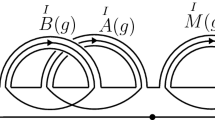Abstract
Lecomte (Prog Theor Phys Suppl 144:125–132, 2001) conjectured the existence of a natural and conformally invariant quantization. In Mathonet and Radoux (Existence of natural and conformally invariant quantizations of arbitrary symbols, math.DG 0811.3710), we gave a proof of this theorem thanks to the theory of Cartan connections. In this paper, we give an explicit formula for the natural and conformally invariant quantization of trace-free symbols thanks to the method used in Mathonet and Radoux and to tools already used in Radoux [Lett Math Phys 78(2):173–188, 2006] in the projective setting. This formula is extremely similar to the one giving the natural and projectively invariant quantization in Radoux.
Similar content being viewed by others
References
Bordemann, M.: Sur l’existence d’une prescription d’ordre naturelle projectivement invariante, math.DG/0208171
Bouarroudj S.: Formula for the projectively invariant quantization on degree three. C. R. Acad. Sci. Paris Sér. I Math. 333(4), 343–346 (2001)
Čap A., Slovák J., Souček V.: Invariant operators on manifolds with almost Hermitian symmetric structures. I. Invariant differentiation. Acta Math. Univ. Comenian. (N.S.) 66(1), 33–69 (1997)
Duval C., Lecomte P., Ovsienko V.: Conformally equivariant quantization: existence and uniqueness. Ann. Inst. Fourier (Grenoble) 49(6), 1999–2029 (1999)
Duval C., Ovsienko V.: Conformally equivariant quantum Hamiltonians. Selecta Math. (N.S.) 7(3), 291–320 (2001)
Duval C., Ovsienko V.: Projectively equivariant quantization and symbol calculus: noncommutative hypergeometric functions. Lett. Math. Phys. 57(1), 61–67 (2001)
Eastwood M.: Higher symmetries of the Laplacian. Ann. Math. (2) 161(3), 1645–1665 (2005)
Kobayashi, S.: Transformation Groups in Differential Geometry. Springer, New York, Ergebnisse der Mathematik und ihrer Grenzgebiete, Band 70 (1972)
Kroeske, J.: Invariant bilinear differential pairings on parabolic geometries. Thesis, School of Pure Mathematics, University of Adelaide, June (2008)
Lecomte, P.B.A.: Towards projectively equivariant quantization. Prog. Theor. Phys. Suppl. 144:125–132 (2001). Noncommutative geometry and string theory (Yokohama, 2001)
Lecomte P.B.A., Ovsienko V.Yu.: Projectively equivariant symbol calculus. Lett. Math. Phys. 49(3), 173–196 (1999)
Mathonet P., Radoux F.: Cartan connections and natural and projectively equivariant quantizations. Lond. Math. Soc. 76, 87–104 (2007)
Mathonet, P., Radoux, F.: Existence of natural and conformally invariant quantizations of arbitrary symbols. math.DG 0811.3710
Radoux F.: Explicit formula for the natural and projectively equivariant quantization. Lett. Math. Phys. 78(2), 173–188 (2006)
Author information
Authors and Affiliations
Corresponding author
Rights and permissions
About this article
Cite this article
Radoux, F. An Explicit Formula for the Natural and Conformally Invariant Quantization. Lett Math Phys 89, 249–263 (2009). https://doi.org/10.1007/s11005-009-0335-2
Received:
Revised:
Accepted:
Published:
Issue Date:
DOI: https://doi.org/10.1007/s11005-009-0335-2



